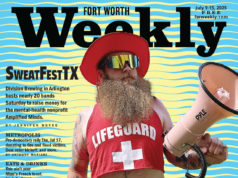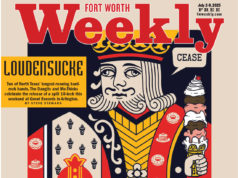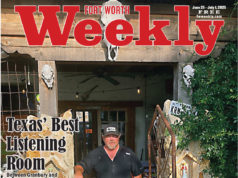For a singer-songwriter who is still relatively new to the local music scene, Jon Ruhl’s career is off to an auspicious start. The Mississippi native recently released a self-titled 11-track album with the help of musician/producer Robert Ellis that was recorded at Niles City Sound, the famed Fort Worth studio of choice for Leon Bridges, Quaker City Nighthawks, and Vincent Neil Emerson, among others. Ruhl’s first major release at age 33 belies the fact that he has been an active songwriter since his teen years in Mississippi. As a child, he said he was endlessly conflicted about the small rural town where he grew up.
“My parents split up when I was really young,” Ruhl said. “Growing up in Mississippi wasn’t a great experience. I didn’t identify with any of the people.”
While locals were content to marry their high school sweethearts and work at their father or father-in-law’s business, Ruhl enlisted in the Navy at 17. As a medic, Ruhl said he served alongside Marines in Afghanistan in 2010 before being deployed off the coast of Libya the following year. After fulfilling his three-year commitment, he left the military and spent the past decade working as a commercial diver on the East and West coasts.
“I was playing music the entire time,” Ruhl said.
While crisscrossing the country — and busking where he could while living out of his van — Ruhl became an avid fan of Ellis, a.k.a. the Texas Piano Man, whose influences pull from country, pop, and jazz.
“I’ve been a fan of Robert for years,” Ruhl recalled. “The first time we shook hands was in Nashville. I think it was right around Christmastime, and he was offering lessons.”
A few months later, in May 2020, Ruhl asked Ellis over a Zoom songwriting lesson if Ellis would help him write an album. Ellis, who had just been brought on to the Niles City Sound team by studio co-founder Josh Block, said he was impressed by the first demos he heard.
“I think the songwriting is cool,” Ellis said. “Jon has lived a very different life than most people. You hear that in his attention to detail. That’s how the whole process started.”
Ellis and Ruhl storyboarded the album, picking songs from dozens of tunes Ruhl had written over the past decade. Around that time, Ruhl visited Fort Worth to record songs for a group he is no longer working with. Ellis hired Ruhl to help around the studio as a handyman. Ruhl said he immediately fell in love with Fort Worth and its community of creatives and decided to stay. In early 2021, Ellis and Ruhl began recording at Niles City.
“The recording process was great,” Ruhl recalled. “We had fun with the songs. It was amazing to watch them grow past how far I was able to go.”
Producer Ellis said part of his goal was to showcase the wide range of styles and sounds that Ruhl’s musicianship is capable of.
“At the core, the goal was to put on a performance,” Ellis said. “What we are trying to do at Niles is performance-oriented music, not building something and sequencing it all and building a perfect vocal. All the stuff we love from the ’60s and ’70s was performed.”
To achieve that sound, he continued, the recording musicians have to be confident enough to not want to retake or edit every little blemish.
“With the technology that exists today, it’s easy to record 100 vocal takes and take one word from each take that is perfect,” Ellis said. “Then, you can tune and time-correct it. I think music suffers because of that. We want to make stuff that we would listen to, stuff that we would like. During a recording session, we might say ‘Man, that vocal line was good. We could fix it. But why? It sounds great.’ ”
The results of the studio time are an odyssey that touches on universal themes of love, loss, and restlessness that tie to Ruhl’s life journey.
“Highway 51” is an up-tempo country song set to drumbeats that churn like a train that has no final destination. Ruhl’s baritone is effortlessly penetrating, and it’s his story that fuels the music.
“Highway 51,” he croons during the chorus. “I swear that I’ll come back again / You can get me home / Highway 51, get me home.”
The heavy opener is followed by the highly danceable, beach-country “Cosmic Trick,” which puts a positive spin on heartbreak and breakups. “Burlap Jacket” is a folksy tune that packs plainspoken lyrics in a song in which assorted instruments build layer upon layer into a crescendo while Ruhl continually returns to the central theme of an old burlap jacket, a metaphor for Mississippi, Ruhl told me. “Thorn,” recorded in one take, opens with fingerpicked guitars and deep, sporadic piano baselines.
“Sometimes the thing you love the most is a thorn in your side,” Ruhl mournfully sings. “It will go in the coffin with you, no matter how big it grew.”
Ruhl’s first album can be divided into songs that are deep and light. Equally, they can be divided into literal and metaphorical songs. The songwriter is equally at home in both worlds, providing entertaining radio-friendly tunes and more poetic works that may be best enjoyed in the comfort of one’s home, where waves of nostalgia and tearful reminiscences can be felt without distraction.
The album, which is available on all major streaming platforms, will soon be followed by live performances by a band Ruhl is putting together with the help of his girlfriend, Claire Hinkle, herself an accomplished singer-songwriter and the daughter of famed bluesman James Hinkle.
The yet-to-be-named ensemble will perform originals by Claire and Ruhl plus the occasional cover, Ruhl said.
“My take on music is that it is entertainment, but it can be more profound than that,” he said.












